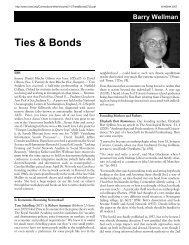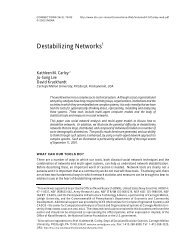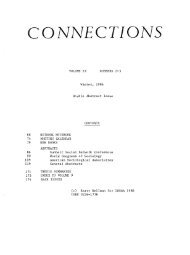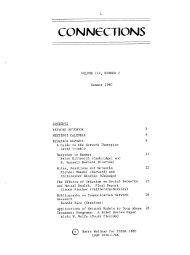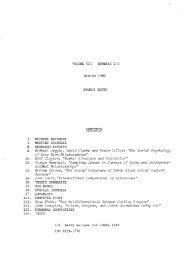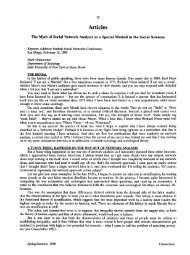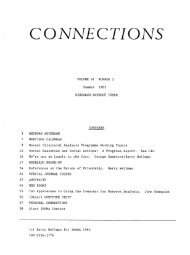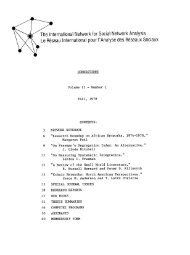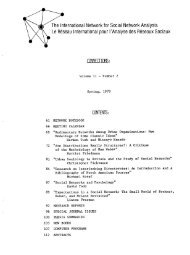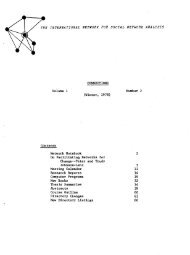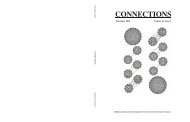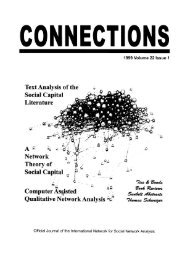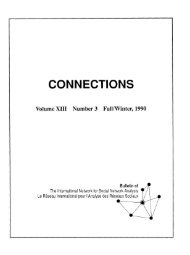Sunbelt XXXI International Network for Social Network ... - INSNA
Sunbelt XXXI International Network for Social Network ... - INSNA
Sunbelt XXXI International Network for Social Network ... - INSNA
Create successful ePaper yourself
Turn your PDF publications into a flip-book with our unique Google optimized e-Paper software.
<strong>Network</strong> Sampling With Memory: A Proposal For More Accurate Sampling From <strong>Social</strong> <strong>Network</strong>sVerdery, Ashton M.; Mouw, TedCollecting <strong>Network</strong> DataSampling, Methods, Data Collection, Respondent‐driven SamplingTHURS.AM1Sampling from a network using a random walk based approach such as Respondent Driven Sampling (RDS) is difficult because the sample can get stuck inisolated clusters of the network, reducing accuracy. In this paper we propose an alternative strategy—<strong>Network</strong> Sampling with Memory (NSM)—that usesmultiple dependent random walks and social network data collected from respondents to <strong>for</strong>ce the sampling process to mix rapidly through the targetpopulation. We test our approach on simulated data and on 30 large university‐based social networks from Facebook. While RDS has an average design effectof 2.3 <strong>for</strong> these 30 university networks, NSM has an average design effect of 1.0—i.e., the same standard error as random sampling—in samples of 500 whennetwork data is collected on 20 friends per respondent.<strong>Network</strong> Science Contributions To Advancing Translational ResearchForthofer, Melinda; Roscoe, Robert; Clarkson, John; Mackelprang, AlyssaAcademic and Scientific <strong>Network</strong>sAcademic <strong>Network</strong>s, Partnerships, Research <strong>Network</strong>sTHURS.AM1Solutions to modern societies’ greatest challenges are likely to come from those who can mobilize knowledge and expertise across perspectives and facilitatetranslation of new knowledge into practice. Academic‐community partnerships are acknowledged as central to such ef<strong>for</strong>ts. Nonetheless, we must movebeyond relationship focused approaches to consider best practices and processes at the level of networks, to in<strong>for</strong>m our understanding of effective systems <strong>for</strong>linking academic and local expertise. As part of a study of one academic institution’s portfolio of community engaged research, we conducted an online surveywith faculty members from the institution’s health science units (N=130). Then, we interviewed community partners (N=34) identified by faculty researchparticipants. Our social network analysis of these examine partnership‐level and network‐level patterns of community engagement. Our results reveal dramaticdiversity of perspectives among network members and highlight areas where academic researchers may fall short of “walking the talk” of community‐basedresearch. Using network analysis to focus on the linkages among collaborating entities and on the patterns and implications of those relationships can in<strong>for</strong>mstrategies <strong>for</strong> strengthening network linkages that are already functioning well, as well as <strong>for</strong> developing linkages to address network gaps. Additionally, we willuse these findings to illustrate how a network approach can in<strong>for</strong>m institutional strategies <strong>for</strong> supporting community engaged scholarship and facilitating thebridging of gaps between researchers and community partners that may hinder the translation of research into practice.



